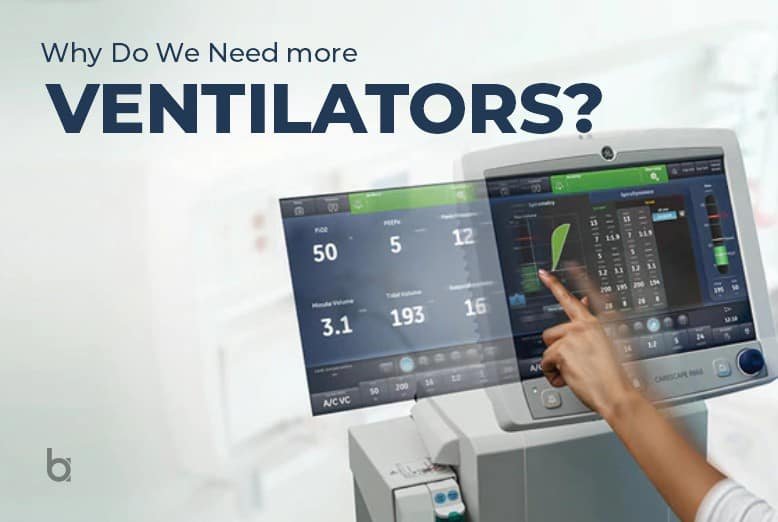Here’s the table showing the current situation all around the world (Updated on 23 April 2020)
| Country | Total cases | Total Deaths | Total recovered | Total Test |
| World | 2,645,703 | 184,325 | 723,188 | |
| USA | 849,092 | 47,681 | 84,050 | 4,326,648 |
| Spain | 208,389 | 21,717 | 85,915 | 930,230 |
| Italy | 187,327 | 25,085 | 54,543 | 1,513,251 |
| France | 159,877 | 21,340 | 40,657 | 463,662 |
| Germany | 150,648 | 5,315 | 103,300 | 2,072,669 |
| UK | 133,495 | 18,100 | N/A | 559,935 |
| China | 82,798 | 4,632 | 77,207 | |
| India | 21,797 | 681 | 4,376 | 500,542 |
Statistical Data Courtesy: worldometers
The relation between Ventilators and COVID-19
Let’s first understand, “What is a ventilator?” A ventilator is a machine that provides mechanical ventilation by moving breathable air into and out of the lungs, to deliver breathes to a patient who is physically unable to breathe, or breathing insufficiently.
In layman’s language, it helps to breathe, when someone is unable to breathe naturally. It acts as a support system or just like extra sets of lungs. It supplies oxygen to the patients.
Now, the question arises, that, “Why are there very few ventilators worldwide?” Coronavirus is a respiratory disease; it attacks and damages the lungs. Healthcare systems all over the world were not geared for a situation like this but now are trying their best to tackle the coronavirus crisis. Although not every patient requires ventilators — it is for the patients who are in critical condition. According to WHO, 80% of people would recover without needing much hospital treatment. But one out of six people who is seriously ill will need more medical attention. In critical cases, the virus can cause damage to the lungs, resulting in lower oxygen levels in the body making it difficult for the patient to breathe.
Then, why is there so much hype to manufacture ventilators? As we all know, Germany ranks as one of the best healthcare in the world. According to the report published on world population review, Germany ranks on 25, while, France tops the list, followed by Italy, San Marino, and other countries. Currently, what’s happening in Germany raises alarm for the rest of the world. The country has 1,160 hospitals with intensive care beds (ITS). This means 33.7 ITS beds are available per 100,000 people.
Understanding The Need Of Ventilators
According to an article published on the BBC website, currently, UK had over 8000 ventilators and is now adding about 10,000 more to the current number. Health Secretary Matt Hancock said, “The country needs 18,000 machines for when the virus peaks, down from an original estimate of 30,000.”
Let’s look at some of the other statistics about the number of required ventilators. According to a new analysis, about 880,000 more ventilators will be needed to deal with the current situation of Coronavirus. Article published on NS medical devices states, it is estimated that, of the COVID-19 cases occurring worldwide, about 10% of patients need ventilators.
US needs about 75,000 ventilators, while countries like France, Germany, Italy, Spain, and the UK collectively require 74,000 ventilators to fill the gap, estimated by GlobalData, an analytics company.
Tina Deng, an analyst at GlobalData’s medical devices said, “Ventilator shortages are a crucial reality as the COVID-19 outbreak continues to worsen globally.” Further, she added, “All ventilator manufacturers have full order books and hold little in stock – receiving orders not only from regular customers such as hospitals but also directly from governments.”
Biggest Manufactures Ventilators
You will be shocked to know that there are only seven companies which are the biggest manufactures of ventilators across the world. On average, the cost of the hospital-level machine would be around $25,000. This cost also varies from company to company. Today, almost every ventilator manufacturer is trying to produce these machines at a much cheaper rate.
Becton Dickinson
Founded in 1897 by two American Businessmen Fairleigh Dickinson and Maxwell Becton. At present, the company has more than 10,000 employees and an estimated net worth around $63bn
Philips
Usually, it produces 1000 ventilators per week but with an increase in the number of coronavirus cases, it said it would increase production to 2000 ventilators per week.
Hamilton Medical
Founded in 1983, the company specializes in the production of “Intelligent Ventilators Solutions.” To deal with the current crisis, it revealed that it has increased the production of ventilators by 50%.
Fisher & Paykel Healthcare
Founded in 1934, it initially started with the manufacturing of washing machines. Later, in 1971, it entered the market of manufacturing of respiratory care. Currently, the company serves more than 120 countries.
Draeger
Founded in 1889, the company reported annual revenue of $3bn in 2019. The company operates in Firefighting, mining, chemicals and also focuses on ventilators.
Medtronic
Understanding the current crisis, the company announced that it has increased the production of ventilators by more than 40%. Presently, it operates in more than 150 countries with a net worth of $100bn.
GE Healthcare
The company is known for producing CARESCAPE R860 ventilator devices. These devices are used for newborns and adults who are in need. Currently, it is worth $19bn and has more than 50,000 employees working all over the world.
An Extra Helping Hand
To overcome the storage of ventilators, many big companies have come forward after the regulations have been relaxed by the Food and Drug Administration (FDA), companies such as Tesla, General Motors and Ford have promised to fulfill the storage of about 75,000 ventilators.
Ford is working along with GE Healthcare and 3M — using parts such as batteries and fans usually used in a car to fulfill the shortage. Tesla has partnered with US medical technology giant Medtronic. Moreover, in Britain to tackle the pandemic, Airbus— the aerospace multinational company is leading from the front and is also working with all its competitors from different industries to spike up the number of ventilators in the NHS from 8,175 to 30,000 within a week.
Companies such as Rolls-Royce, Siemens, GKN and Meggitt, Formula 1 team McLaren, aerospace company BAE Systems and Ford have come forward to offer their facilities to manufacture the ventilators.
Work Towards Harmony
I hope this blog helped you to understand the reality of ventilators in the world. Nevertheless, we need to understand that if we work together in harmony, we can tackle the pandemic. As individuals, it is our prime responsibility to adhere to all the guidelines issued by the WHO. Moreover, you can keep yourself aware and also spread awareness about the current situation and keep yourself updated with all the dos and don’ts.
Reference links : nsmedicaldevices.com















